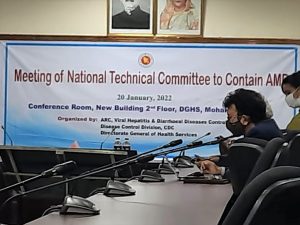Bangladesh Moves Forward With Five-Year Action Plan to Contain AMR
Antimicrobial resistance (AMR) is one of the most serious and growing threats to public health globally. The common misuse of antibiotics and other antimicrobials is giving rise to antibiotic-resistant bacteria, causing infections that are harder to treat. The National Strategy and Action Plan for Antimicrobial Resistance Containment (ARC) in Bangladesh for 2021–2026 was developed with technical support from the USAID Medicines, Technologies, and Pharmaceutical Services (MTaPS) Program. In a major step forward in the fight against AMR, the National Technical Committee for ARC of the Government of Bangladesh approved the plan in March 2022.

National Technical Committee discussing the National Strategic Action Plan for Antimicrobial Resistance Containment for approval, January 2022
AMR is one of the top ten global public health threats facing humanity and requires urgent multisectoral action to achieve the Sustainable Development Goals set by the United Nations. Recognizing this urgency and spurred by the nomination of Sheikh Hasina, the Honorable Prime Minister of Bangladesh, as co-chair of the One Health Global Leaders Group on AMR in November 2020, the Government of Bangladesh has stepped up its momentum to contain AMR in the country. Accordingly, the Directorate General of Health Services (DGHS) under the Health Services Division of the Ministry of Health and Family Welfare initiated the revision and updating of the 2017 national action plan for AMR with technical support from MTaPS and other stakeholders.
The 2021–2026 national AMR action plan is a multistakeholder plan based on the One Health approach and involves various sectors that have a role in containing AMR, including human health, animal health, aquatic health, and the environment. The action plan serves as the country’s roadmap to tackle the public health challenge of AMR and outlines the priorities and interventions to be implemented in Bangladesh from 2021 to 2026. The plan is an updated version of the 2017 national action plan developed by the Communicable Disease Control (CDC) unit of the DGHS—the focal body for AMR containment in Bangladesh—as part of its operational plan for treating viral hepatitis and diarrhea.
Approval of the action plan to contain AMR attests to the high-level political commitment, with the DGHS, Institute of Epidemiology, Disease Control and Research, Directorate General of Drug Administration, Department of Livestock Services, Department of Fisheries, Department of Agriculture Extension, Bangladesh Livestock Research Institute, Bangladesh Fisheries Research Institute, Department of Environment, and Bangladesh Food Safety Authority taking leading roles in implementation.

Dr. Sanya Tahmina, MTaPS Bangladesh, presenting the 2021–2026 National Strategic Action Plan at the stakeholder workshop, September 2021
A joint workshop, organized by the CDC and facilitated by MTaPS in September 2021, convened all stakeholders along with global agencies and donors, including USAID, World Health Organization, UN Food and Agriculture Organization, Fleming Fund, International Centre for Diarrhoeal Disease Research, and US Centers for Disease Control and Prevention, to present and review the 2021–2026 action plan. Following the workshop and discussions, the National Technical Committee for ARC, which is the highest-level multisectoral and multidisciplinary executive technical body headed by the Director General of the DGHS, granted technical approval of the five-year plan for containing AMR in March 2022.
The 2021–2026 action plan was developed through a series of consultative processes facilitated by MTaPS, such as focus group discussions; key informant interviews; strengths, weaknesses, opportunities, and threats analysis; and multistakeholder consultation meetings with different sectoral focal persons, experts, professional bodies, and academia. Desk reviews of international guidelines, resolutions, global and national action plans, scientific and popular articles, and workshop and meeting proceedings were consulted during the development of the plan.
The approval of the five-year plan is a milestone in Bangladesh’s efforts to contain AMR using the One Health approach that can successfully eliminate the threat and ensure continued efficacy of antibiotics in treating diseases.